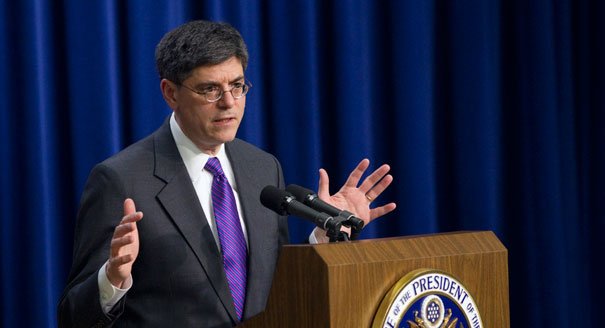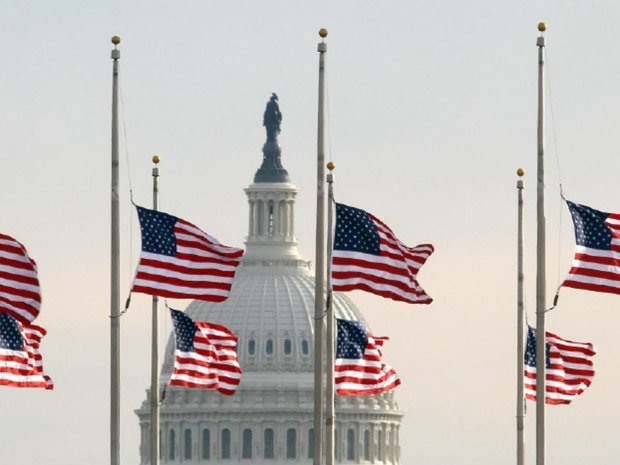Home Tags Posts tagged with "debt ceiling"
debt ceiling
The US government careens toward a potentially devastating shutdown as Republicans and Democrats in Congress remain deadlocked on a budget to continue its funding.
Agencies have begun making contingency plans ahead of the October 1st deadline to pass a new funding resolution.
The Senate has passed a bill to fund the government through November 15.
But House Republicans have said they refuse to approve the bill absent a provision to strip funding from President Barack Obama’s health law.
The Senate is controlled by Barack Obama’s Democratic party, while the Republicans hold the majority in the House of Representatives.
As a result, lawmakers are at a stalemate as the deadline approaches.
Government agencies have been selecting workers considered essential should funds stop flowing.
The looming shutdown is one of two fiscal crises facing the US government. On October 17, the US treasury department’s authority to borrow money to fund its debt obligations expires unless Congress approves a rise in the so-called debt ceiling.
On Friday afternoon, President Barack Obama urged House Republicans to pass the Senate’s stopgap budget bill and to extend the debt limit, and demanded they not threaten to “burn the house down because you haven’t gotten 100% of your way”.

President Barack Obama urged House Republicans to pass the Senate’s stopgap budget bill and to extend the debt limit
Barack Obama said if the nation were to default on its debt, it would have a “profound destabilizing effect” on the world economy.
“Voting for the treasury to pay its bills is not a concession to me,” he said.
“No-one gets to hurt our economy… just because there are a couple of laws [they] don’t like.”
The president described the healthcare law as “a done deal” and said the Republican-backed repeal effort was “not going to happen”.
Barack Obama said the Senate had “acted responsibly” in passing the budget measure and that now it was up to Republicans in the House of Representatives “to do the same”.
If the government does shut down on October 1st, as many as a third of its 2.1 million employees are expected to stop work – with no guarantee of back pay once the deadlock is resolved.
National parks and the Smithsonian museums in the nation’s capital would close, pension and veterans’ benefit cheques would be delayed, and visa and passport applications would be stymied.
Programmes deemed essential, such as air traffic control and food inspections, would continue.
The defense department has advised employees that uniformed members of the military will continue on “normal duty status”, but “large numbers” of civilian workers will be told to stay home.
Last week, the US House of Representatives a bill that would maintain the US government’s funding levels through November 15 but strip funding from Barack Obama’s health law, known as Obamacare.
On Friday the Senate passed a version of the bill with the defunding provision removed 54-44, largely on party lines.
“The Senate has acted and we’ve done it with bipartisan co-operation. We’ve passed the only bill that can avert a government shutdown Monday night,” Democratic Senate leader Harry Reid said.
“This is it, time is gone.”
The House is now expected to take up that bill at the weekend. Unless the two chambers can come to a consensus and pass a bill for Barack Obama to sign, the federal government will close on October 1st.
[youtube L81WGdj6_yo]
Treasury Secretary Jack Lew has warned that he US will hit its debt ceiling by October 17, leaving the government with half the money needed to pay its bills.
Jack Lew said that unless the US is allowed to extend its borrowing limit, the country will be left with about $30 billion to meet its commitments.
“Net expenditures on certain days can be as high as $60 billion,” he said.
The US government and Republicans are at stalemate over extending the credit limit needed to avoid default.
President Barack Obama and the Democrats have said they will not negotiate with Republicans over their demand that the government agrees budget cuts in return for backing a rise in the borrowing limit.
Jack Lew’s comments underline how close Washington is to running out of money. Failure to reach a deal would be “catastrophic” for the US economy, he said in a letter to House Speaker John Boehner.
“Treasury now estimates that extraordinary measures will be exhausted no later than October 17. We estimate that, at that point, Treasury would have only approximately $30 billion to meet our country’s commitments.

Jack Lew said that unless the US is allowed to extend its borrowing limit, the country will be left with about $30 billion to meet its commitments
“If we have insufficient cash on hand, it would be impossible for the United States of America to meet all of its obligations for the first time in our history,” Jack Lew said.
Jack Lew urged Congress to “act immediately” and increase the borrowing ceiling, which has been limited at $16.7 trillion since May.
In return for supporting a rise in the ceiling, Republicans are pushing for a series of measures, including a delay by a year in the introduction of the Affordable Care Act, which would increase benefits under Barack Obama’s Medicare health programme.
A spokesman for John Boehner said Jack Lew’s letter was a reminder of the need for an agreement to raise the ceiling while at the same time cutting US debt.
But he added: “And it should remind President Obama that refusing to negotiate with Congress on solutions just isn’t an option.”
Washington faced a similar impasse over its debt ceiling in 2011. Republicans and the Democrats only reached a compromise on the day the government’s ability to borrow money were due to run out.
In his letter, Jack Lew reminded Congress that the 2011 battle “caused significant harm to the economy”.
That fight was resolved just hours before the country could have defaulted on its debt, but nevertheless led to ratings agency Standard & Poor’s downgrading the US for the first time ever.
The 2011 compromise included a series of automatic budget cuts known as the “sequester” which came into affect earlier this year.
[youtube rpVM_fI_NdQ]
US Treasury Secretary Jack Lew has warned that the government will reach its debt limit by mid-October unless Congress acts quickly.
The debt ceiling was last raised in January. The government can no longer borrow if it is reached.
Jack Lew said that in such a case it will be unable to meet obligations such as pensions, military salaries and Medicare payments.
The country’s borrowing limit is currently capped at $16.7 trillion.
“Extraordinary measures are projected to be exhausted in the middle of October,” Jack Lew said in a letter to House Speaker John Boehner and other lawmakers.
“At that point, the US will have reached the limit of its borrowing authority, and Treasury would be left to fund the government with only the cash we have on hand on any given day,” he said.
The cash balance at that time is forecast to be about $50 billion, which Jack Lew said, would be “insufficient to cover net expenditures for an extended period”.

The US government will reach its debt limit by mid-October unless Congress acts quickly
He said: “Operating the government with no borrowing authority, and with only the cash on had on a given day, would place the United States in an unacceptable position.”
There have been tense debates between the White House and congressional Republicans over the government’s debt ceiling, spending cuts, and other fiscal matters.
In August 2011, the Republicans and the Democrats took a hard line while debating raising the borrowing limits.
They only reached a compromise on the day the government’s ability to borrow money was due to run out.
The delay in reaching a deal at that time led ratings agency Standard & Poor’s to downgrade the US for the first time ever, which sparked volatility in the financial markets.
The compromise also included a series of automatic budget cuts known as the “sequester” which came into affect earlier this year.
However, in his letter Jack Lew argued that raising the debt limit does not increase government but “simply allows Treasury to pay for expenditures [the] Congress has previously approved”.
He warned that a delay in raising the limit “would cause irreparable harm to the American economy”.
Jack Lew explained that if investors become unwilling to loan to the US, the country could face an immediate cash shortfall.
”Such a scenario could undermine financial markets and result in significant disruptions to the economy,” he said.
Standard and Poor’s has raised its credit outlook for the US economy from negative to stable.
In August 2011, S&P downgraded the US rating one notch from AAA to AA+, but now believes further downgrades are less likely as the economy continues to recover.
The news saw the US dollar strengthen 1.3% against the Japanese yen, and 0.2% against the euro.
But S&P is still concerned about the high levels of US debt.
The US Treasury Department, which had said that S&P’s calculations in making its initial downgrade were flawed, welcomed the latest action.
“We’re pleased that they are recognizing the progress in the US economy and fiscal results,” said Mary Miller, the Treasury’s under secretary for domestic finance.

Standard and Poor’s has raised its credit outlook for the US economy from negative to stable
The rating agency said in its report the strengths of the US include “its resilient economy, its monetary credibility, and the US dollar’s status as the world’s key reserve currency”, while its weaknesses include “its fiscal performance, its debt burden, and the effectiveness of its fiscal policymaking”.
It noted “tentative improvements”, namely Congress’s avoidance of the “fiscal cliff” at the end of 2012 and the higher-than-expected tax receipts that followed.
But it also said the ability of policymakers to address medium-term fiscal challenges had decreased over the past decade due to a deepening of the partisan divide between Republicans and Democrats in Washington.
“We believe that our current <<AA+>> rating already factors in a lesser ability of US elected officials to react swiftly and effectively to public finance pressures over the longer term in comparison with officials of some more highly rated sovereigns and we expect repeated divisive debates over raising the debt ceiling,” S&P said.
It said the likelihood of it downgrading the US’s rating in the near term was now “less than one in three”.
The move came as the Paris-based Organization for Economic Co-operation and Development (OECD) said that economic growth in the US and Japan was outstripping that of the eurozone.
But most US analysts remained cautious about the upgrade and the equity markets were little changed in New York.
Omer Esiner, chief market analyst at Commonwealth Foreign Exchange in Washington DC, said: “The revised rating is positive news for the dollar but I do not see it being a major catalyst.
“This is just the latest indication that we are seeing a broad stabilization and improvement in the economy and ultimately the government’s fiscal position is improving, albeit slowly.”
Rival rating agencies Moody’s and Fitch have both kept their AAA ratings for the US.
[youtube 5KdCyCQV_Lc]




